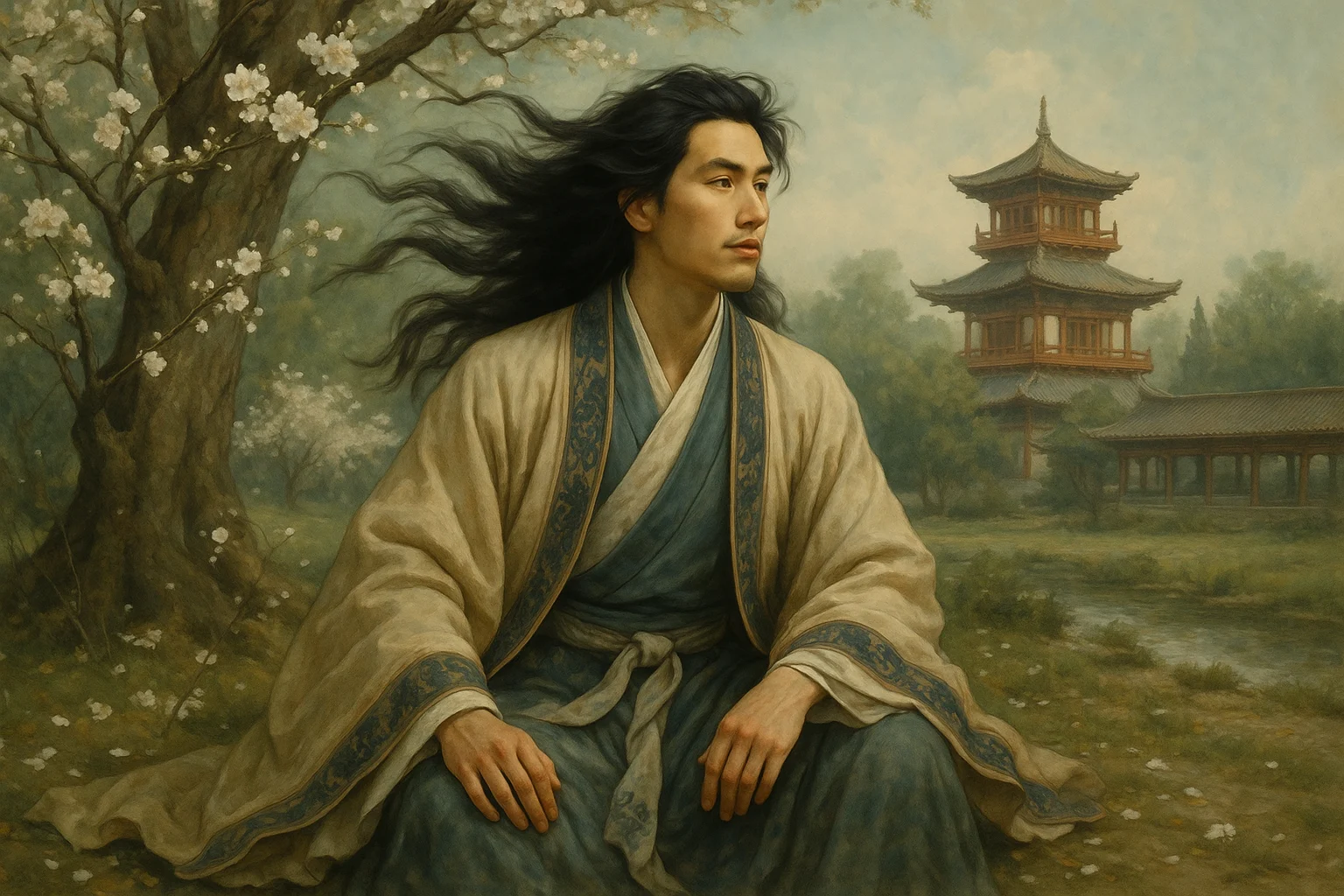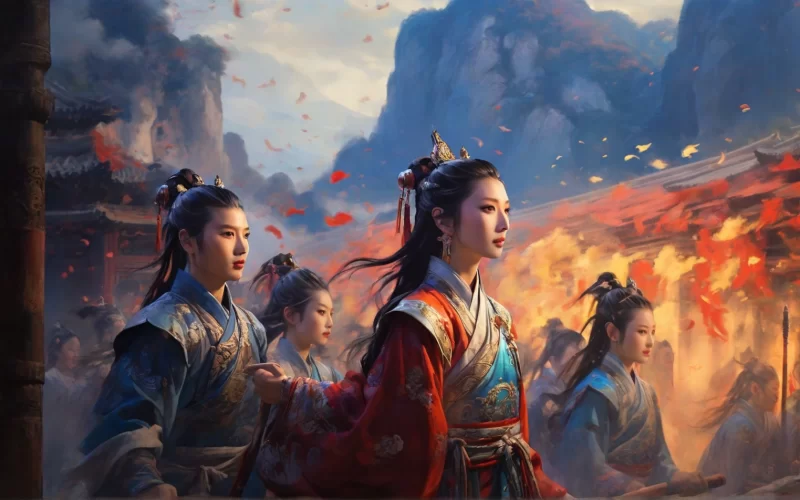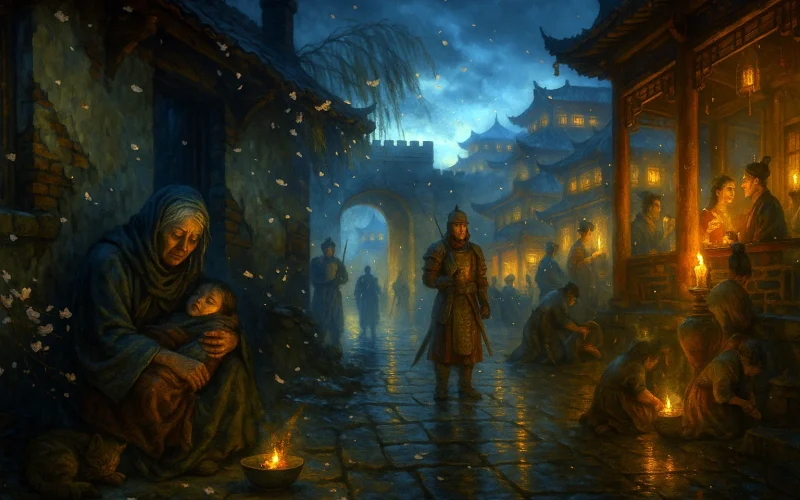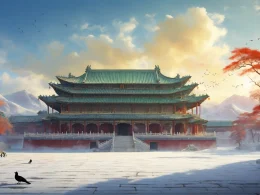While a cold wind is creeping under my mat, And the city's naked wall grows pale with the autumn moon, I see a lone wildgoose crossing the River of Stars, And I hear, on stone in the night, thousands of washingmallets .... But, instead of wishing the season, as it goes, To bear me also far away, I have found your poem so beautiful That I forget the homing birds.
Original Poem
「酬程延秋夜即事见赠」
韩翃
长簟迎风早,空城澹月华。
星河秋一雁,砧杵夜千家。
节候看应晚,心期卧亦赊。
向来吟秀句,不觉已鸣鸦。
Interpretation
This poem is a response to a friend's work, belonging to the genre of "he shi" (和诗, reply poetry). Inspired by the friend's poem, the poet uses the imagery of an autumn night to express his emotions, staying up all night reciting the beautiful verses. While the poem does not delve into profound philosophy or heavy emotions, its fresh and elegant descriptions reveal sincere friendship and delicate sentiment.
First Couplet: “长簟迎风早,空城澹月华。”
Cháng diàn yíng fēng zǎo, kōng chéng dàn yuè huá.
The tall bamboo mat greets the early autumn wind; the quiet city bathes in the pale moonlight.
This couplet paints a serene and chilly autumn night. The bamboo mat feels the wind early, hinting at the arrival of autumn's cold, while the quiet city under the faint moonlight reflects a sense of solitude. The stillness carries a subtle chill, mirroring the poet's own subdued emotions.
Second Couplet: “星河秋一雁,砧杵夜千家。”
Xīng hé qiū yī yàn, zhēn chǔ yè qiān jiā.
A lone goose flies across the autumn night under the starry river; the sound of washing mallets echoes from a thousand homes.
This couplet uses sound to emphasize silence. The contrast between the "lone goose" and the "thousand homes" highlights the emptiness of the autumn night while also evoking the bustling life of households. The solitary goose underscores the night's desolation, while the sound of washing mallets reflects the deep emotions of those longing for their loved ones.
Third Couplet: “节候看应晚,心期卧亦赊。”
Jié hòu kàn yīng wǎn, xīn qī wò yì shē.
The season seems late, and my heart's longing delays my rest.
This couplet continues the imagery of the autumn night, further expressing the poet's restless emotions. The deep autumn and late hour suggest the passage of time, yet the poet, preoccupied with thoughts of his friend, finds sleep elusive.
Fourth Couplet: “向来吟秀句,不觉已鸣鸦。”
Xiàng lái yín xiù jù, bù jué yǐ míng yā.
I have been reciting your exquisite verses, unaware that the crows have begun to caw at dawn.
This couplet brings the poem to its climax, showing the poet's admiration and resonance with his friend's verses. Immersed in the joy of reciting the beautiful lines, the poet loses track of time until the crows' cawing signals the break of dawn.
Overall Appreciation
The poem captures the serene and chilly atmosphere of an autumn night, interwoven with the poet's emotions as he stays up late reciting his friend's verses. It delicately portrays the passage of time and the poet's lingering thoughts, blending natural imagery with personal sentiment. The lines "A lone goose flies across the autumn night under the starry river; the sound of washing mallets echoes from a thousand homes" are particularly striking, offering a vivid and harmonious depiction of the tranquil and beautiful autumn night. The poet skillfully merges natural scenery, personal emotions, and the friend's verses, creating a layered and heartfelt expression.
Writing Characteristics
- Serene Imagery, Blending of Scene and Emotion: The poem uses the bamboo mat, pale moonlight, lone goose, and washing mallets to create a tranquil yet poignant autumn night atmosphere.
- Vivid Contrasts, Enhancing Emotion: The contrast between the "quiet city" and the "thousand homes," as well as the "lone goose" and the "thousand homes," emphasizes the poet's solitude and contemplative state.
- Sincere Emotion, Subtle and Profound: The poet's sleepless night spent reciting his friend's verses reflects the depth of their friendship and mutual appreciation.
Insights
This poem, set against the serene backdrop of an autumn night, reveals the poet's deep appreciation for friendship and his love for beautiful verses. It reminds us that true friendship lies not only in daily interactions but also in spiritual resonance and emotional comfort. Through the imagery of the night and his recitation of the friend's verses, the poet transforms his emotions into a heartfelt tribute, showcasing the beauty of silent connection and profound mutual understanding in friendship.
Poem translator
Kiang Kanghu
About the Poet

Han Hong(韩翃), a native of Nanyang, Henan, was one of the "Ten Literary Masters of the Dali era" (大历十才子). He was renowned for his poetry, particularly farewell and parting verses, which gained significant acclaim during his time. The Complete Tang Poems (《全唐诗》) preserves three volumes of his works.












